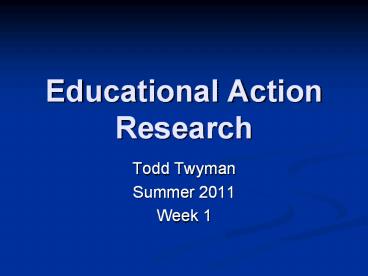Educational Action Research - PowerPoint PPT Presentation
1 / 20
Title:
Educational Action Research
Description:
Educational Action Research Todd ... these steps may be ... 1_Stream Educational Action Research Ethics of Research Respect Beneficence Justice The ... – PowerPoint PPT presentation
Number of Views:457
Avg rating:3.0/5.0
Title: Educational Action Research
1
Educational Action Research
- Todd Twyman
- Summer 2011
- Week 1
2
Ethics of Research
- Three basic principles
- 1. Respect
- 2. Beneficence
- 3. Justice
3
Respect
- Allow participants to make choices about
participating. - Select methods that minimize harm.
- Maintain confidentiality.
4
Beneficence
- Try to ensure participants well-being
- Consider
- How will the research benefit the participants in
the study? - How will the research benefit the population or
society at large?
5
Justice
- Consider who ought to receive the benefits of
research and bear its burdens - Who is involved in the research?
- Who will benefit?
- Focus on overcoming your own inherent biases that
will influence your interpretation of reality. - General semantics (from reading)
6
The Influence of Perspective
- Each of you will be assigned a particular
perspective. - Go outside and observe for 15 minutes from the
perspective youve been assigned. - Return and meet with others who share your
perspective to discuss what you saw / any
meanings it might hold. - Share as a class. Reflect
7
The questions you ask determine
- Your methodology
- Methods of gathering data
- Types of analyses you will run
- The sort of conclusions you can come to
- In short, your questions drive your research
8
Two Major Traditions
- Qualitative
- Attempts to figure out why things are the way
they are, to describe cultures, groups, events - Microscopic look at phenomena
- Quantitative
- Attempts to figure out the extent to which
something is related to something else to
generalize to a larger population - Wide-angle look at phenomena
9
Research
- Typically leans most heavily on one or the other
research methodologies. - But may use methods from the other to present a
more well-rounded picture. - Case study with test scores used as one form of
data. - Treatment/ Control Group Pre- Post-test design
with interviews as one form of data.
Reflect
10
(No Transcript)
11
Elements of Research
- Reflection - define the problem
- Select a Focus - state a hypothesis or research
question - Collect and Analyze Data - design a study to
gather relevant information - Interpret Data - consider the results in light of
the context - Draw Conclusions - determine what actions can be
taken
12
Reflection Understand the Context
- Action research is conducted within a context.
- Consider the context when identifying the problem
situation. - Review the relevant research that may inform the
situation.
13
Select a Focus
- Identify
- What do you want to change?
- What will make a difference?
- Frame your focus
- Measurable
- Observable
14
Pose a Question
- Research Question
- Open ended approach to research
- Not stated as an expected outcome
- Hypothesis
- Focused approach to research
- Clear expected outcome
- Null hypothesis Statistical step not needed in
Action Research
15
Collect and Analyze Data Select an Approach
- Mixed-Methods v Single Method
- Qualitative
- Descriptive
- Observational
- Narrative
- Quantitative
- Numerical
- Measured outcomes
- Statistical analysis of results
16
Collect and Analyze Data Select a Design
- In Quantitative approaches
- Identify the target variables
- Determine how you will investigate the
relationship between the variables - Control for outside sources of error
- In Qualitative approaches, these steps may be
more fluid.
17
Examples
- Spending an additional 20 minutes a day reading
silently in the classroom will improve student
scores on statewide reading tests. - Students who eat a light snack 1 hour before
reading class will improve scores on ORF tests
faster than students who dont eat a snack or who
eat a full 800 calorie lunch.
18
More Examples
- Students prefer using electronic readers (eBooks)
to print texts with identical content. - Students retain more of the information presented
in class lectures when they are required to
reflect on that information in writing at least
once per hour during lectures.
19
Nonexamples
- What can I do to make students pay attention in
class? - How can I deliver this material to make it more
interesting? - Is there any way I can get more money for my
work? - Why did I go into teaching in the first place?
20
Homework
- Read Chapters 3 - 4 in Glanz (after class).
- Make a list of possible topics for an Action
Research project this term. Ill collect them
tomorrow morning - Purpose To solidify the skills youre learning.
- Goal A complete study (including data which
youve analyzed) by the end of Fall 2011 term. - Remember This is an exercise you are building
the muscles to perform independently in the
future!































